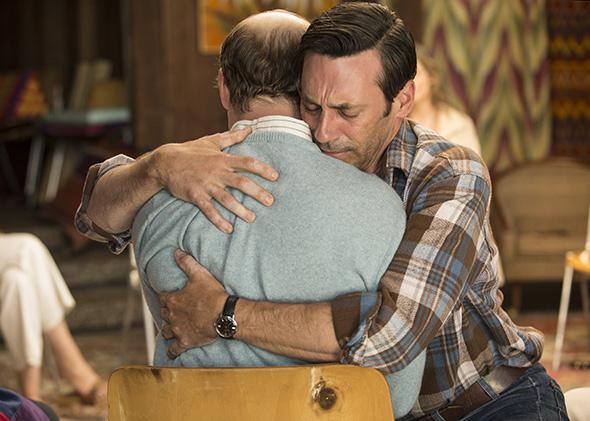Read the rest of Slate’s Mad Men coverage.
Hanna, John,
You both took somewhat dim views of the finale—Hanna for its mortification of Peggy, and John for its tidy tying of bows. But now that I’ve had a night to think it over, I’ll come out and say it: I think Mad Men stuck the landing. The finale was not perfect (you both convinced me that the Peggy resolution was cloying and unbelievable, and Roger’s romance felt superfluous). But it was pretty darn great, and the ambiguity inherent in that final scene will stay with me for a long time.
There are several ambiguities, actually. The first is about what kind of happiness and success Don actually achieves. Perhaps Don’s return to advertising means he’s finally at peace, a happy ad man. Or perhaps this is just another of his cyclical renewals, a moment of bliss and success before gravity (and women, and alcohol, and his tendency to randomly pull the ripcord on his own life) drags him downward again. But for me that open-endedness was a strength, and for now we know Don will keep trying.
So Don is redeemed as a creative. But as a human? The finale was ambiguous there too. The fact that Don spends even a second out West after learning Betty’s news—that he accepts her conclusion about his familial uselessness, rather than challenging it—suggests no. And when Don offers his litany of sins, it feels odd that he lists making “nothing” of the Draper name up there with breaking his vows, scandalizing his child, and stealing a man’s identity. If Don thinks boosting the Draper name with a blockbuster campaign will make up for his sins, he’s mistaken.
But there have been several currents in the past few episodes that suggest abandoning your children is the one form of self-expression that Mad Men can’t condone. The sheer quantity of child-abandoners on the show boggles the mind, when you think about it. Greg, Diana, Peggy, Roger, Pete, Stephanie, Don: In the past few episodes, all of the characters on this list who aren’t pure villains accept some responsibility for their lost kids, whether by explaining what they feel for them, as Peggy does, or providing for them, as Roger does, or rejoining them, as Pete does, or accepting responsibility for them, as Stephanie seems to. However ambivalent this show is about Don, he’s not a Greg. This flurry of emotional or actual reunions suggests to me that Don will soon be in a kitchen with Sally, somewhere, sharing a Coke with the girl who understands him best. Or at least helping out with the dishes.
The epidemic of child abandonment on the show also helps clarify what really interested Matthew Weiner about the ’60s. He was moved not by the political promise of the era, but by the psychodynamics of an age when men and women put themselves, rather than their obligations, first. And he writes from the perspective of the abandoned generation, both oppressed and liberated by their parents’ experiments. Sally may be free to pursue adventures in the future, but first she’s got to bring up baby Gene.
This perspective may shed light on Mad Men’s other great ambiguity, which is whether the show has respect or contempt for advertising. Is being an ad man an inevitably jerky thing to be? Don finds fulfillment on a grassy hilltop thanks to a moment of genuine human connection—and immediately conceives of a way to peddle that connection in the service of a gigantic international brand. Perhaps that makes him a despicable avatar of capitalism. But Weiner isn’t interested enough in ’60s idealism to deeply lament that someone is commodifying it. He appreciates the irony, of course, but he doesn’t condemn the act. Instead, I think he fundamentally respects advertising, because what good advertising requires (at least on Mad Men) is craft and human insight. And those are the two qualities Mad Men has consistently delivered.
Mad Men was sometimes hammy, lugubrious, and self-important. But it was much more often gorgeous, hilarious, subtle, surprising, and wise. Hanna, John (and across the years, Michael, Patrick, Willa, Paul, and Seth): Thanks for convening here time and again to discuss what I think will stand as one of the greatest shows TV has ever produced. (It may be aided in this quest by being a period piece already; perhaps it will age better than some of the competition.) And thanks, too, to Slate’s commenters, a fascinating and insightful band of fellow close readers. I raise a glass of Coke to all of you.
Cheers,
Julia
Read the previous entry, by John Swansburg | Read the next entry, by Hanna Rosin
